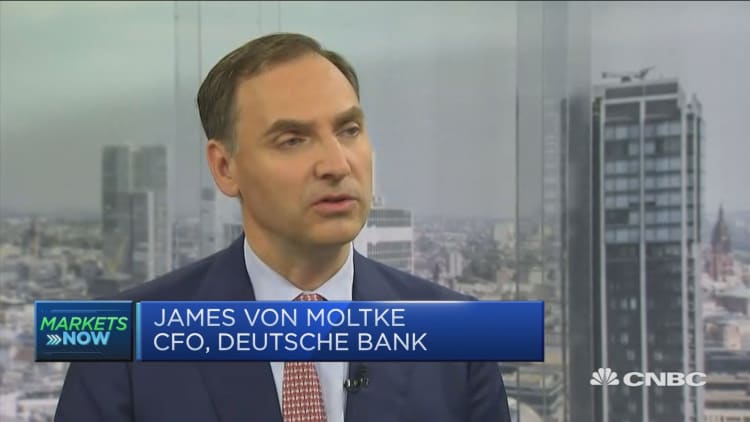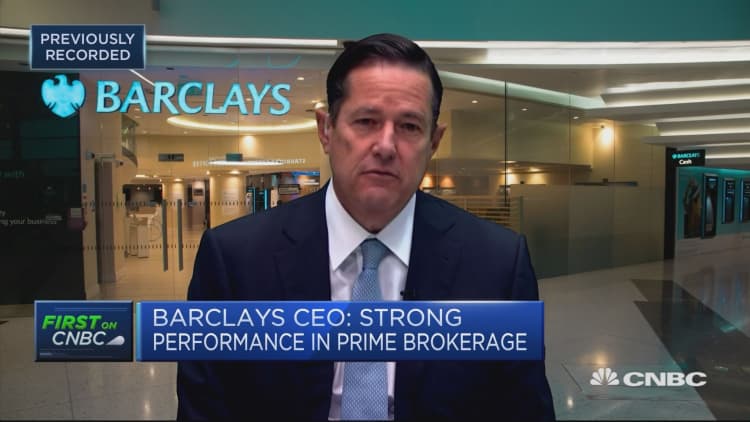Despite averting disaster in the current earnings season, European banks continue to be plagued by persistent low interest rates, with a host of banking executives citing current central bank strategy as a key risk to future profitability.
The European Central Bank (ECB) has maintained a low interest rate policy since the euro sovereign debt crisis of 2011, with market expectations pointing to further cuts as the central bank strives to achieve its inflation target of below, but close to, 2%. Low interest rates are designed to encourage borrowing but restrict the bank's ability to lend at profitable rates, thus adding pressure to margins.
The U.S. Federal Reserve last week cut interest rates by 25 basis points, its first cut since 2008, while the Bank of England held its rate steady at 0.75%. The ECB held firm last week but signaled stimulative rate cuts for the future.
During the current earnings season, executives at the majority of major European banks have lined up to comment on the world's low rate environment and its impact on their businesses.
'Penalties for savers'
Credit Suisse CEO Tidjane Thiam, speaking to CNBC following the bank's second-quarter earnings report, said: "I am not a great fan of low interest rates, as a great believer in the importance of savings in the economy. Subsidies to debtors and penalties for savers, I think in the long term harms the economy."
Credit Suisse beat analyst expectations for the second quarter, reporting a net income of 937 million Swiss Francs ($945 million) compared to 647 million Swiss francs a year before.
Societe Generale Deputy CEO Philippe Heim told CNBC that the continuation of dovish ECB policy is "not good news."
"For sure, for the financial system it puts pressure on retail activities. At some point it also puts pressure on insurance companies," Heim said. "What is important for us is being a diversified bank."
The French bank's retail division saw a drop of 2.5% in net income from a year ago, but Societe Generale said it had achieved a "solid performance" amid the low rate environment.
Deutsche Bank was in a minority of banks to report weaker-than-expected earnings, posting a 3.15 billion euro loss for the second quarter amid a massive restructuring program announced last month.
Notwithstanding the numerous unique headwinds facing the embattled German lender, its earnings report also expressed concerns about the impact of persistent low rates.

"If these conditions were to persist for an extended period of time, and not be offset by accommodations such as the tiering of reserves held by banks with the Eurosystem central banks, this could result in a significant impact on revenues relative to our current expectations," the Deutsche Bank earnings report stated.
"Actions to offset this rate impact, such as pricing changes or the introduction of fees, may not be sufficient to offset this impact."
UBS announced its highest second-quarter net profit since 2010, coming in at $1.4 billion, but blamed a "u-turn in the interest rate environment" in the U.S. for a decline in its global wealth management business and investment bank division.
UBS CEO Sergio Ermotti told CNBC that he is not sure whether further easing will propel the economy in the way central bankers are hoping.
"I'm not sure going deeper into negative territory or using the QE (quantitative easing) is the way to get out of the problems…We need more structural answers," he said.
Ermotti warned "there are severe broader considerations than just the banking industry" from low rates.
The Swiss lender warned in its results that a return to monetary stimulus could "adversely affect" profits going forward.
'We have to do our part'
Barclays on Thursday reported better-than-expected second-quarter earnings of £1.03 billion ($1.25 billion) and upped its dividend payment by 20%.
CEO Jes Staley also addressed the low rate environment when speaking to CNBC following the release, but struck a more compassionate tone than some of his peers.
"In the medium-term, it is a challenge for all banks on the income side when you have interest rates approaching zero and in many cases below zero. Effectively when risk-free money is free, that is a challenge for the banking industry," Staley told CNBC.
"On the other side of that, if it holds off a recession and generates economic growth, there is great benefit to the banks in having that growth. It's a fine balance that the central bankers have to play."

Staley added that major banks have to "do our part to make sure that we are extending credit to businesses" in order to help facilitate the GDP growth that central bankers are seeking.
However, he cautioned that persistent rates at "effectively zero" risk creating "bubbles in the valuation of other assets" that might be exposed if interest rates start to increase again.
BNP Paribas CFO Lars Machenil opted to focus on the bank's measures to mitigate the damage inflicted by low rates.
"Interest rates are low for a while and that is why we continue our adaptation and that's why we even stepped up the adaptation in this quarter, to make sure that we can be ready in that environment to help our bottom line to grow," he said.
BNP Paribas saw net profit rise 3.1% to 2.47 billion euros on the back of strong growth in its corporate and investment banking unit.
'Corrosive environment'
Hani Redha, multi-asset portfolio manager at PineBridge Investments, told CNBC on Friday that although the banks had averted disaster this earnings season, things are going to get worse before they get better.
Redha anticipates a "big package" of easing measures from the ECB.
"It will consist of rate cuts, QE, but also some tiering of negative interest rates which can mitigate but our assessment is that overall it is still going to be negative," he told CNBC's "Squawk Box Europe".
"This environment is very corrosive for these banks, deposit costs are really at the lower bound, and so with loan spreads continuing to tighten, I think net interest margins are still set to contract. I struggle to see anything that can really offset that core issue," Redha added.


